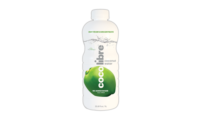All-natural plant waters gain traction
Coconut water, watermelon water drive growth

For the second consecutive year, bottled water was named the No. 1 beverage in the United States, by volume, according to New York-based Beverage Marketing Corporation (BMC). As consumers thirst for the hydrating benefits of water, they also are reaching for new flavors, varietals and types of bottled water, experts say. In fact, 54 percent of consumers who are drinking more water than they were three months ago are trying other types of bottled water, says Chicago-based Mintel in its September 2017 report titled “Plant waters flourish, boast added benefits.”
The market research firm highlights that natural plant waters, including coconut, pure maple, watermelon and rose, provide electrolytes, antioxidants and value-added qualities that tap water cannot.
When it comes to the attributes, flavors and functional benefits that impact water consumers’ decision to purchased bottled water, Mintel reports that natural, at 57 percent, is the top attribute, followed by vitamin enhanced (33 percent), antioxidants (31 percent), flavors (31 percent) and organic (23 percent).
“Being ‘natural’ is the top attribute sought in bottled water, and should be integral to promoting naturally sourced water, but so should flavor, color and supplements,” the report states. “ About a third [of consumers] designate flavor, vitamins, antioxidants or electrolytes as sought-after attributes, which further supports development of products with these qualities.”
Alexander Esposito, research analyst at Euromonitor International, Chicago, also points to this trend. “This category has shown strong global growth over the last eight years, especially in the U.S. and Brazil. The products are growing due to increased consumer demand for healthy and functional beverages. The use of natural plant-based ingredients rather than other functional ingredients is a particularly attractive point for these products.
“Health-andwellness trends are a major driver for coconut waters and plant waters,” he continues. “As opposed to popular sports drinks, coconut waters and other plant waters offer functional hydration benefits without the addition of synthetic ingredients that many consumers are choosing to avoid. Organic certification is certainly a plus when it comes to coconut and plant waters but does not seem to be a characteristic at the top of consumers’ minds.”
Healthy hydration
Overall, plant waters are performing well, says BMC’s Gary Hemphill, managing director of research. “It’s a fledgling category that is still developing and being defined. One issue with tracking performance depends on how the category is defined, but overall, we’re seeing growth from a small base.”
Chicago-based SPINSscan reports a 3.2 percent-point increase in the overall shelf stable plant water segment for the 52 weeks ending April 22 in specialty gourmet and multi-outlets. Aloe, cactus, prickly pear, maple and tree waters posted dollar sale increases, with watermelon waters and almond waters serving as growth drivers for the segment, says Kimberly Kawa, SPINS’ retail reporting analyst.
Plant waters labeled as organic also fared well. “Shelf-stable plant waters labeled 95-100 percent certified organic [had] an overall growth rate of 14.5 percent of an $8.1 million segment,” Kawa says. “All products in this set, regardless of organic status, are seeing less-rapid growth at 3.2 percent, but they do account for $78.9 million.”
While refrigerated ready-to-drink coconut water saw an increase of 26.3 percent, shelf-stable coconut water saw a deceleration of 6.6 percent, based on SPINS data.
“All refrigerated plant waters, except for maple water and aloe water, are on the rise,” Kawa adds. “Watermelon water SKUS, with a variety of flavor pairings from ginger to tart cherry, are growth drivers.”
“Coconut waters are by far the most important category within plant waters, however, other types of plant waters are starting to gain traction,” Euromonitor’s Esposito says. “Birch water, watermelon water and maple water are examples of different types of plant waters gaining traction.”
In its April report “Juice Production in the US,” Los Angeles, Calif.-based IBISWorld notes new product innovation and health trends are changing the trajectory of product offerings in the juice category.
“Quickly growing niche products, such as coconut water and tropical-flavored beverages, are attracting new entrants,” the report states. “Over the next five years, innovations will lead to modest growth. Heavier competition will bolster profitability for companies that can attain higher product prices. Overall, revenue is forecast to grow at an annualized rate of 0.5 percent to $12.1 billion over the five years to 2023.”
BMC’s Hemphill notes the greatest innovation in refreshment beverages is coming from products with health-and-wellness attributes. “We still view the health-and-wellness sector of refreshment beverages as somewhat underdeveloped,” he says.
As more products and segments emerge in the plant water category, Hemphill predicts increased innovation and variety. “More innovation and more variety is in store for the plant water category in the future,” he says. “A handful of segments within the category are likely to define the category and lead its growth in the years ahead.” BI
Looking for a reprint of this article?
From high-res PDFs to custom plaques, order your copy today!







